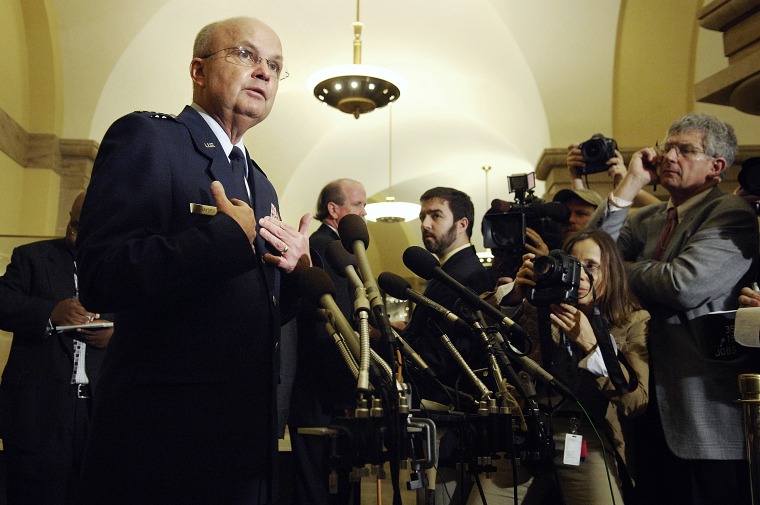Ex CIA and NSA spy chief Michael Hayden has called Edward Snowden "morally arrogant," for selectively leaking classified information, and Hayden repeatedly complained about people who spill secrets to the press.
But on Thursday, Hayden got caught providing anonymous information to reporters himself. A passenger seated near Hayden on the Acela train from Washington to New York live-tweeted several conversations Hayden had in which he disparaged President Obama and boasted of tactics long repudiated by the administration, including secret prisons operated by the CIA.
Hayden has a long history of defending the government's right to selectively determine what the public needs to know. Hayden led the NSA’s illegal surveillance program. Defending it at the time, former President Bush told Americans they didn’t need to be concerned with the program as long as they had nothing to hide.
It turns out that even Hayden has secrets he'd prefer to keep. He was overheard talking about classified programs while telling reporters to quote him only as “a former senior administration official.” (In fact, Hayden only served six weeks in Obama’s administration, as a placeholder during the government transition. He had tried to stay on at the CIA, but Obama asked him to leave.)
In December 2007, while running the CIA, Hayden sent reminder notes around Langley headquarters telling subordinates not to disclose classified information. The notes came after former CIA officer John Kiriakou admitted that Abu Zubaida, a suspected terrorist, had been waterboarded. Hayden admitted to Congress that month that he had overseen the destruction of two videotapes of interrogations. Kiriakou was convicted of leaking information to the press.
Tom Mattzie, the passenger who overheard Hayden, tweeted that the former CIA director could be heard in his calls with reporters "bragging about rendition and black sites." But during Bush's presidency Hayden fought to prevent The Washington Post from revealing information about the secret programs. Hayden twice submitted statements in federal court arguing that any discussion of the sites would cause "grave harm" to CIA intelligence efforts.
During his confirmation hearing to head the CIA, Hayden swore he would take the same hard line approach against unauthorized leaks that his predecessor Porter Goss had. "Obviously I know how we all abhor leaks," Hayden said. Goss fired a veteran intelligence officer just days before she was scheduled to retire when she admitted she had spoken to reporters without approval. "I admire Director Goss for the action he took with regard to this last round of unauthorized disclosures," he told Sen. Saxby Chambliss.
Although he demanded anonymity from reporters Thursday, Hayden doesn’t like others to use it. In a September speech he said, "The problem I have with the internet is that it's anonymous." He admitted in the same speech that he is no fan of Google, calling Gmail "the preferred internet service provider of terrorists worldwide." Maybe he still uses Hotmail?
In a column Hayden wrote for CNN on July 19, the former spy, who worked closely with former Vice President Dick Cheney, wondered what right Snowden had to release classified information. "It takes a special kind of arrogance for this young man to believe that his moral judgment on the dilemma suddenly trumps that of two (incredibly different) presidents, both houses of the U.S. Congress, both political parties, the U.S. court system and more than 30,000 of his co-workers."
Hayden now works for The Chertoff Group, a security firm that bids for lucrative government contracts. He said in an August interview with the Washington Times that opposition to government secrecy is nothing more than youthful naivete. Skilled potential recruits harbor "a romantic, absolute attachment to transparency," he said. These would-be analysts would do well, he suggested, to accept that "there are some things governments need to keep secret."
Hayden has also argued that there are some things that the public simply does not need to know. During an appearance on CBS' Face the Nation in September, he laid out his ideal scenario for ensuring accountability. "In a perfect world I would brief the House and Senate intelligence committees and be done with it," he said. The public may want to know what is being done in their name, but "this is not ancient Athens, this is not a direct democracy. It is a representative democracy. So although I'm saying there are more things that should be made public, there will be some things only the committees will know."
Committees and Amtrak train cars, it seems.
